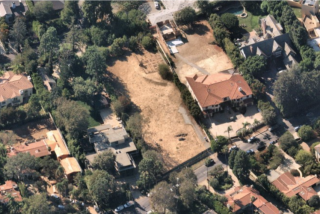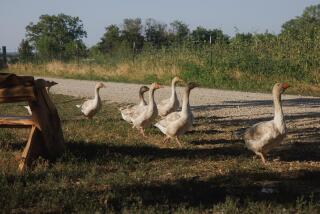BOOK REVIEW Down on the Farm: Dying Way of Life in Rural America : TREES, WHY DO YOU WAIT? Americaâs Changing Rural Culture <i> by Richard Critchfield</i> , Island Press $29.95, 270 pages
Now that Garrison Keillor has abandoned Lake Wobegone for the Big Apple and Farm Aid has been shelved in the Museum of Good Intentions, who speaks for the American farmer?
Robert Critchfield does.
Critchfield, a journalist by trade and a social historian in practice, celebrates what he sees as the glories of the American family farm--and, more to the point, bemoans its sad decline--in âTrees, Why Do You Wait?,â a book that consists of equal measures of anthropology, economics, oral history, family memoir and a utopian call for reform in farm policy.
To Critchfield, as to commentators from Pliny the Elder to Thomas Jefferson to Norman Borlaug, the farm is the root and branch of human civilization:
âWe are finding there is no alternative to the rural base of our urban culture,â Critchfield writes. âThe breakdown of the American family and social ethics, along with crime, drugs, homelessness and so on, all go back to our urban societyâs movement away from its agricultural base.
âThere is simply no substitute for the farm and small town when it comes to forming human culture.â
âTreesâ shows us two slightly fictionalized farm communities--âPrairieâ in North Dakota and âCrow Creekâ in Iowa--and each one becomes a synecdoche of the family farm in the American Midwest. Their rise and fall describes an arc that peaks with the âbonanza farmsâ of the last century and sinks into what Critchfield calls the âhurt bagâ of the â80s.
Some 70 voices from Prairie and Crow Creek are heard in these pages, and their plaints are made to stand for the economic and social stresses that threaten the survival of the family farm in America: roller-coaster interest rates, land rents and crop prices; absentee land ownership; sinking farm income; the eternal allure of the big city; the decidedly mixed blessings of computerization, mechanization and bio-technology on the farm; the contemporary affliction of high-tech corporate farming, and the ancient ones of drought and blight.
âTreesâ is also a sentimental journey of considerable charm and poignancy. Critchfield was born in the little town he calls Prairie, and his sources include the letters, journals and sermons of the country people that were his forebears.
At moments, Critchfield summons up a vision of the American farm that is nearly dreamlike in its resonance; when Critchfield takes us for a stroll along Main Street in Prairie, we find ourselves in a real-life Lake Wobegone where everything passes from history into memory before our very eyes.
Even when Critchfield is apparently only reporting what he sees, the effect is almost haunting. For example, he visits an aging farm couple who have managed to ignore most of the intrusions of contemporary farm life, but he allows us to understand that they are, like the farm and the farmhouse they inhabit, mere antiques.
âIn what she called the parlor was a large grandfather clock,â he writes. âIts pendulum swung back and forth, ticking off the seconds, the minutes, the lives. It filled every silence. âThat clock has never stopped running in all my 83 years,â the old woman told us with grim satisfaction.â
Much of Critchfieldâs work as a reporter amounts to a chronicle of the village as a building block of civilization throughout history and around the world.
âTreesâ fits neatly into the Critchfieldâs life work--he presents Prairie and Crow Creek as not different in essence or destiny from the villages in India or Iran or the Russian steppes.
Critchfieldâs publisher, by the way, is a foundation-supported house that specializes in books on conservation--mostly practical handbooks like âBetter Trout Habitat: A Guide to Stream Restoration and Managementâ or alarm-sounding stuff like âThe Rising Tide: Global Warming and World Sea Levels.â
âTrees,â however, is something quite different. Critchfield aspires to offer practical solutions to the problems that he describes with palpable pain and despair, but his final chapter--a colloquium of âexpertsâ on farm policy--is pretty much a shrug.
Even Critchfield seems to concede that the family farm will either survive or not, regardless of which expert the government decides to believe, but he insists that we must not underestimate whatâs stake.
âThe radical change I would like to see is not so much in farm policy,â he concludes, âbut rather in the way urban people perceive the rural crisis.â For the readers who find their way to âTrees,â at least, he will have accomplished that much.
Next: Mark Feeney reviews âAll Bright Courtâ by Connie Porter (Houghton Mifflin) .
More to Read
Sign up for our Book Club newsletter
Get the latest news, events and more from the Los Angeles Times Book Club, and help us get L.A. reading and talking.
You may occasionally receive promotional content from the Los Angeles Times.








